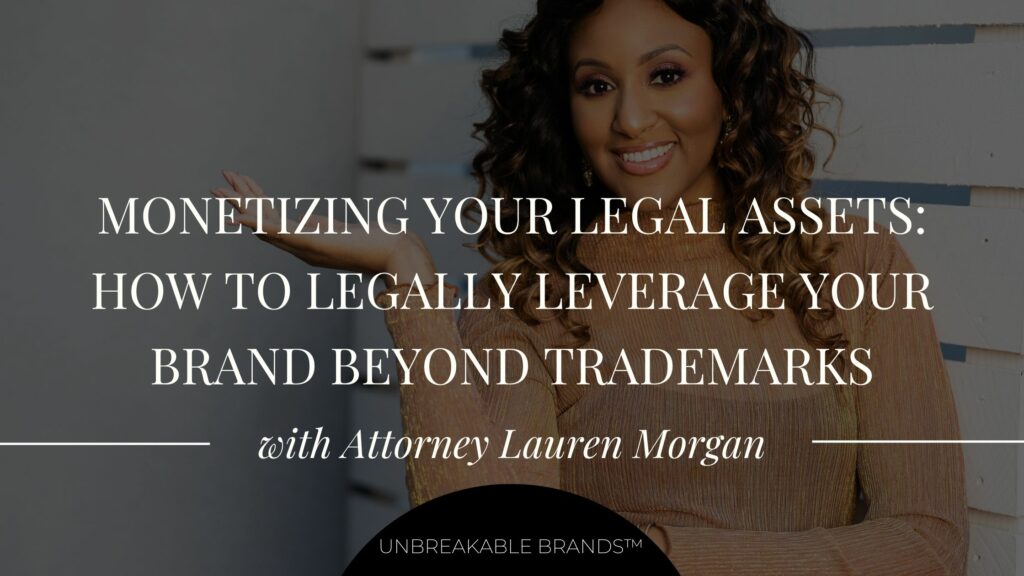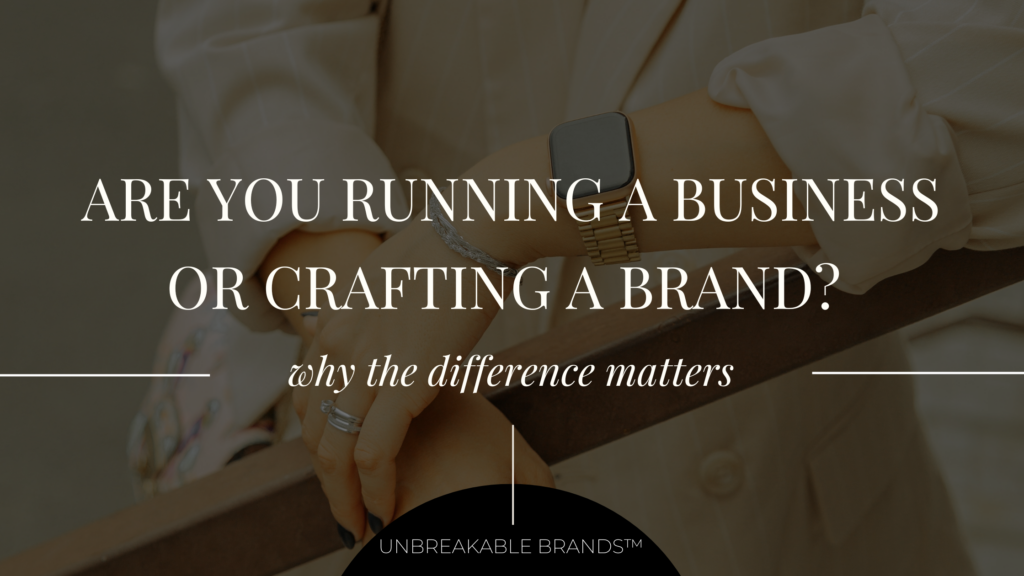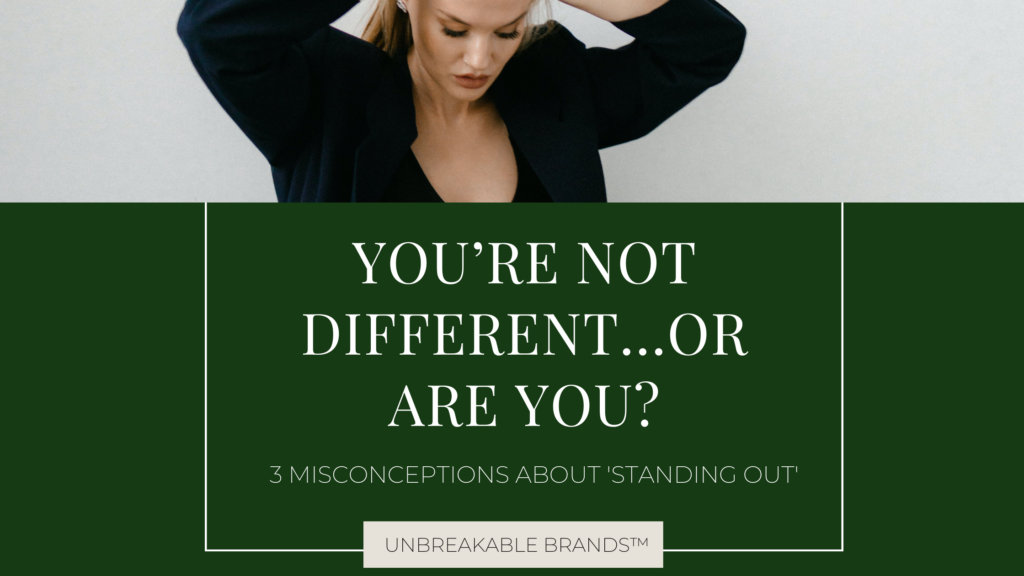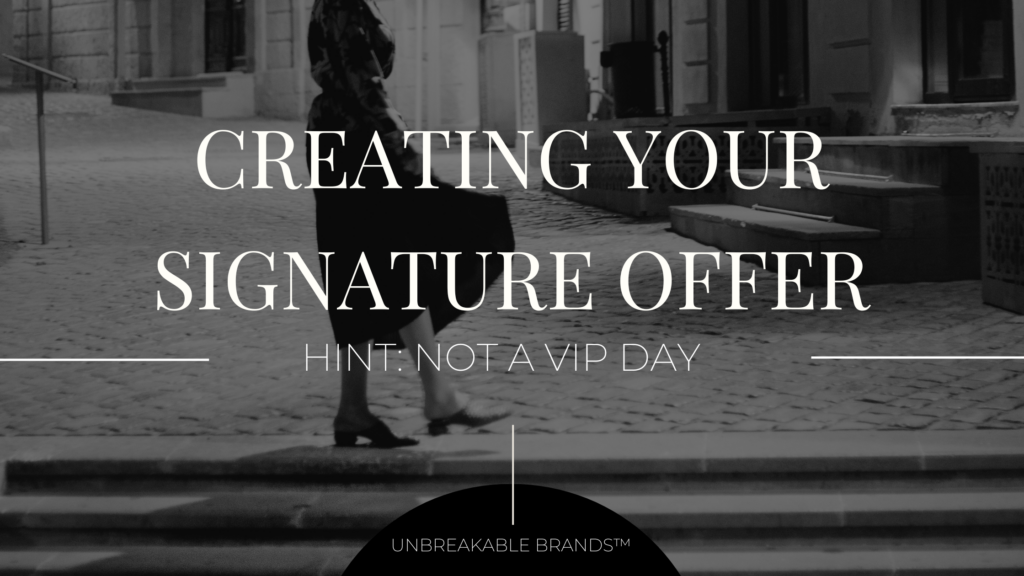I am so thrilled to welcome Lauren Morgan to the show today and talk more with her about monetizing your legal assets and how to leverage your brand.
Lauren Morgan, Esq. is the founder of Activated Law, a boutique law firm providing pre-litigation legal services for small businesses. She has been recognized for her work and was voted one of the “Top 10 Solo Firms in AZ”.
Morgan is a high achiever, graduating high school at 16 and starting her first nonprofit as a college student. In 2017, she left corporate America to start her own law firm in Phoenix, where she leads with faith and continues to defy gravity.
Welcome Lauren!
A part of scaling is we need to seal all the holes. We need to make sure we are saving money where we can and not leaking money out.
– Lauren A. Morgan, Esq., Business and Trademark Attorney
Here’s what you can expect to hear in this episode:
- Lauren’s background from corporate America to thriving boutique law firm
- The brand protections you should have in place before thinking about legal monetization
- The copyright process
- Other forms of legal monetization of your brand
- The biggest mistakes Lauren sees from a legal perspective when people are building their brands
Resources Mentioned In
This Episode
Take The Brand Quiz To Unearth Your brand personality
Pop over to our brand and web design agency and take the free brand personality quiz to begin diving into your brand persona.
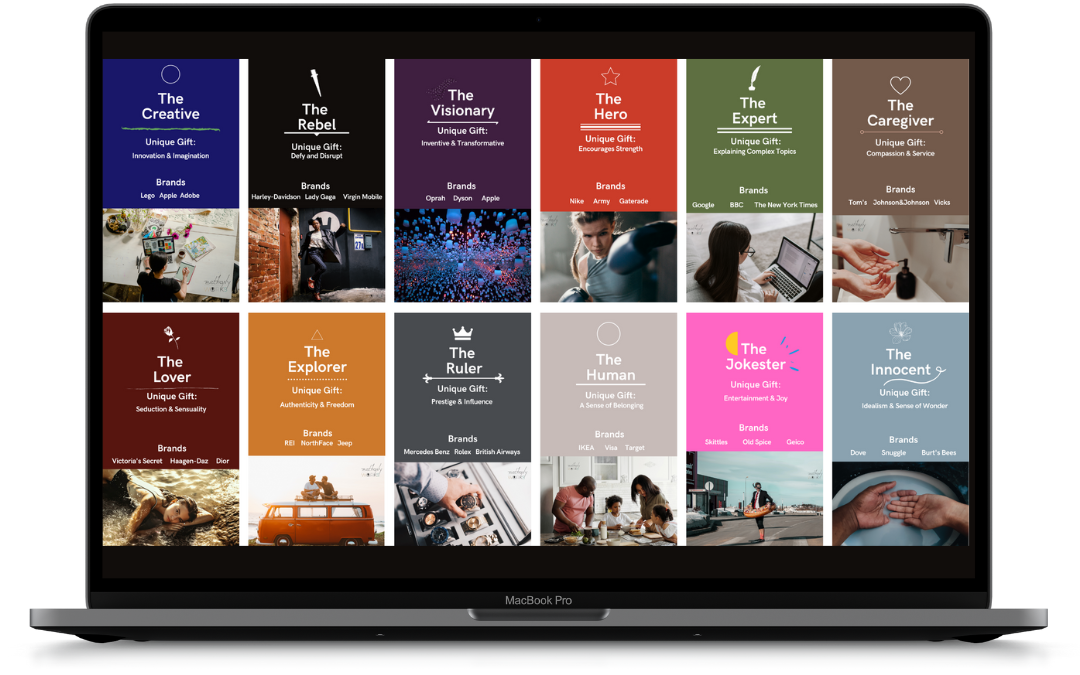
How did you get to where you are today? Did you always want to be a lawyer?
I think my story is really fortunate. I’m really blessed. I always kind of knew what I wanted to do. I would walk around the house always saying I wanted to be a doctor or a lawyer. I went to college at 16. I had to make that decision kind of early. I remember I prayed. And I was, oh God, what do you want me to be?
My dad told me that he had a dream that I was a lawyer, he does not remember telling me this to this day. Ever since then, I was like, I’m gonna be a lawyer. So I went on to college, so on so forth. I’m a very big believer in what you are purposed to do will chase you down. No matter how far you run from it, you just got to accept the calling.
When I tell you I tried to run from being an attorney, I tried to run from it. It literally chased me down, eventually ended up going to or moving to Arizona going to law school in Arizona, and getting involved with it, I was very intentional with my career.
So how I kind of ended up where I am today is that I have the connection,s have the qualifications to go into a bigger law firm, but I knew the lifestyle that came with that. I was very intentional to not go there. Because I didn’t want to have a failure of work-life balance, you get all this money, but you don’t even have a life to enjoy the money, right?
I turned all of it down, too, my parents are like, are you crazy? I took a very unconventional and more challenging route to build myself up to where I’ve gotten today. But I have the freedom in the life that I have now that allows me to have the balances, which is why it’s so faith-led, right? Because it doesn’t always make sense. There’s not always someone I can look to for an example. But I wouldn’t trade it for the world. I love it.
What brand protections should you have in place before you think about legal monetization?
The foundation
It’s so multifaceted in it, some things people are doing naturally and incorporating it. But it’s really foundational, we can’t talk about the monetization piece until we talk about your foundation.
So you really have to have the right entity in place. Do you have an LLC? Do you have a corporation, being a sole proprietor isn’t protection, you are solely liable for everything that happens in your business? So making sure you have an entity in place multiple entities in place.
your contracts
Next your contracts. Is your contract working for you? Do you have the right clauses in place? Did you pull a template off of Google? Nothing wrong with that in the startup phases.
Honestly, I’m not knocking it. I love Google. Google is a great starting place. So become aware of the things that we don’t know and you can’t do. You don’t know what you don’t know. So Google is a great place foundational. It started with a ball-moving category for thinking with things however, you do need to make sure that your contract is working for you and not against you.
Does it reflect what you are currently doing in your business and can it be a hindrance? I can’t tell you how many times I talk to clients, and they’re like, hey, I’m in this conundrum; here’s my contract. Here’s what happened, what do I do? How do I handle this etc?
It really boils down to, I say, annually at least making sure you are editing your contract, making sure you are updating it, make sure it was reflective. Our businesses are living, they change all the time, everything is happening. Sometimes your business, your work schedule, family, life is changing, and your business needs to change to reflect that. Make sure that’s reflected in your contract, right?
intellectual property
trademarks
Intellectual property isn’t just trademarks. So intellectual, trademarks are sexy, right? Like everybody wants to get the trademark, and wait times are off the charts. Because during the pandemic, trademarks just went crazy. We started hearing about celebrity issues with trademarks. And the 50 Cents and the Kim K’s of the world and Beyonce having suits with trademarks, they became very sexy. And so that’s what people highlight. They are definitely protected. I’m not gonna say you don’t need to trademark. You do. You need multiple.
copyrights
I like to talk about copyrights because everyone is sleeping on copyrights. People don’t often know where a copyright falls into the scope of their business. But copyrights are one of the easiest and most assessable ways to protect your business in regard to the things you are creating.
Later when we talk about monetization, I’ll talk about some cool things; once we have copyrights, how we can benefit from that.
patents
Another type of intellectual property that is kind of seen as a scary piece of intellectual property are patents. There is definitely a place for patents, they are the most costly and the most time-consuming in the intellectual property world.
But patents, my goodness patents do a lot for people. Patents cost a lot of money, but they can make you a lot of money. I, unfortunately, don’t practice patent law; they have to have a specific background for it. But I know the general gist of it, the scope of it enough to advise people and this is a patent, this is what the process is what you would need, this is who you need to go talk to. But patents are a very important piece of it. So just really quickly for the gist of it.
I just dropped three intellectual property types. And people are like, well, what’s the difference? Yeah, patents are for protection and invention, something that you have created. Trademarks are for your brand, name, logos, slogans, service names, product names, colors, even a small sound bite can be a trademark. Copyright is going to be for the things you create, things that you are promoting in your business that you’re doing. You can have a both. You can have both a copyright and a trademark for the same thing. It’s about how you actually use it, which is going to determine if it’s a trademark or a copyright.
What does the copyright process look like?
Copyrights are fairly simple. You can self-apply for it; if you have a bulk of applications, we want to kind of approach it a little bit differently. So what I recommend is that if you are creating materials for your company and your business, we want to copyright that. The first thing I want to say too, is what I am speaking about is the registration of a copyright.
Copyright is the only type of intellectual property that from creation, you are protected. The problem becomes enforcing that protection because if someone steals your work, and you just said, oh, I created it first, I did that, you are going to have the burden of proof to showing where you came from that you had at first.
There is basically going to be he says she says. They’re gonna say well, no, I had it first. And here’s my proof. Here’s that versus registration of your copyright. You do this at copyright.gov. That’s the official copyright site. There is actually copywriting that you can then get copy written, it’s hundreds of words and all types of fun stuff. But a copyright once you create it, you get protection, right?
You can put the “C,” you can put the year things of that nature from when it was created. However, if you are creating a lot of things and you are vulnerable for people coming and stealing your brand, I see it happen all the time people have come in and stolen complete websites, people have come in and taken your book or things like that.
So a good rule of thumb is the more it’s going to be available. It’s going to be exposed to the public the more I would go for a registered copyright, not just the innate copyright that you have from creation. So the copyright process is really just filing it paying the fee, you wait for them to send you an official approval back that they reviewed it, that they saw it, etc. And then they kind of go from there regarding the copyright.
What are other forms of legal monetization of your brand that people should be aware of?
Once we lay this foundation, we want to take every single piece of the foundation and capitalize it; we want just to put it on automation. We are scaling here; we are talking about taking what is already in place in your business. Or if you don’t have all of these protections, the foundation, putting those foundational pieces in place, and scaling them and taking them to a new level without you necessarily having to add additional resources such as hiring people, outsourcing, or getting a video team and recreating a whole lot of things.
We are repurposing what you already have in your business to monetize my way, right? Different types of ways you can do it. But my suggestion is, how do we come alongside of you as a legal partner and help you monetize your business?
creating a nonprofit
So the first element of that we talked about your entity making sure you have some protection, and you’re not a sole proprietor; once we have that entity in place, a missing component and piece that a lot of people are missing is a nonprofit, and you don’t need a nonprofit to replace your business. You want it to work in conjunction with your business because this is just a theory that I observed, and I’m a lawyer, so o we put together nonprofits.
If you look at any wealthy person, that is, and I want to look at the best of the best, the greats of the greats, and look at their examples. But if you look at Bill Gates, if you look at Jeff Bezos, if you look at the Elon Musk of the world, they have nonprofits. The reason they have nonprofits is because they are leveraging the tax code within a nonprofit entity and how they can save money.
A part of scaling is that we got to fill up all the holes, we need to make sure that we are saving money where we can save money and we are not leaking money out. Having a nonprofit when you get to six figures or more is crucial because you need a tax-saving element and a component with your business. And so this works in tandem with your accountant, right?
I’m not a tax attorney; I do net numbers and things like that. I do the entity side and the setup. I often work with accountants to make sure, from a tax perspective, their clients are set up appropriately and able to leverage it. Then I cover them on the legal side just from setting it up, making sure they’re in place. Then passing that entity on to the accounting who’s going to maintain it year after year with actually filing the deductions, strategizing with you sitting down, and making sure you have every single piece in place for it.
clauses in the contract
Everything we did in the foundation, we’re coming back, and we’re leveling up. So next will be our contracts. We want to make sure that our contracts have clauses that protect us and that we are able to leverage. We want to make sure that it has late payment clauses, and we want to make sure that it has a force majeure, which I had negotiated a lot of contracts during the pandemic.
Unfortunately, my business was booming because people were having all these contract issues because they did not have a force majeure that covered a pandemic. A force majeure covers any event that is outside, and it’s not foreseeable for either party, and the party did not intentionally or once again could not foreseeably prevent this from happening.
It restores both parties as if the contract never happened so that they can either still go forth and perform the contract or they will both be led out of the contract without penalty to the other party as it was an unforeseeable, usually referred to as an act of God in the force majeure and then they can list out different details.
Prior to the pandemic, people had an epidemic in their force majeure, but they were not capitalizing on pandemics, which is, is the thing now it happens, right? So pretty much it can be broad, where you have any unforeseeable event, you know, by nature or things like that, and then you list out some of the specifics.
But you also want to have like interest payments in there for service providers, which means we’re taking appointments, we have meetings, some of us have coaching sessions built into our offerings that we’re giving people, well, what happens if this person buys a package of six, but then they rescheduled?
The first one, they don’t show up again, you’re going to forfeit that at some point; I can’t continue to take the cost of that in my business because that will really hinder your operation, it causes a bottleneck, and it doesn’t allow things to go seamlessly. Now you are manually scheduling when they were using the link before because you’re trying to work them in; that is hindering our practices and ultimately hindering us from making more money and positioning ourselves, right?
Being a service provider, these are things that you have to account for. And unfortunately, protect yourself against because life is gonna happen. It’s not intentional. It’s not that people are bad people, but life is gonna life. And when life lifes, we want to make sure we have been proactive in being ready for that, and not reactive.
So I’ll just throw this thing in, it is not for me, it is for anyone; this is why you consult attorneys because our brains and our practice and experience have trained us to know about the things that you don’t know about in your practice, that experience is going to teach you, but we want you to be prepared before you even have to take that, when experience hits you because life is gonna life right. So that’s the contract piece of it.
leveraging intellectual property
Then we talked about intellectual property; we can leverage all of those in a lot of different ways. All of them can be licensed the same, or all of them can be leveraged in the same type of ways.
So patents, once again, trademarks, and our copyrights are going to be the intellectual property I’m referencing; we can use all of those in different capacities to license our business out, we can white label our business, we can franchise our business, we can go and create partnerships and affiliate programs, right.
However, the reason that foundation is so important here is that you have to own it first; if you don’t own these things, and you just get out here, and you start creating partnerships, or you start creating, you know, affiliate programs and you create a white labeling process, but you don’t own it. You’re not giving them anything, right? What’s nothing is stopping them from taking it and going and owning it themselves, going and protecting it themselves. Right?
So the two things that I like to focus on are once that trademark piece, right, getting the protections in place, but then how do we capitalize our brand? How can our brand make us money?
And then specifically, on the copywriting piece, all of us have copyright, every single person, we have lead magnets, we have courses, we have ebooks, we have things that we have created within our business, even as service providers, there are processes, there are things that we’ve created that if we looked at, we could then take those things, go and get them protected, re-bundle them up a little bit, right, and then re repurpose it and resell it create evergreen programs where they are on auto-repeat every single month. They are creating and making us money without us having to do anything.
create a monetization plan
Then lastly, those are the four components I talked about before. But with all of that, what I provide to my clients in a program that I offer is the monetization plan.
Once we get all these foundational pieces in place, great, once we go in and we put the protections in place to monetize those plans, what do we do with it, then how do we make our legal assets work for us, and so I create a monetization plan for my clients and show them a framework of everything, we just protected everything we just discussed all of their future goals, their future processes, and say, this is how you’re going to do this. This is how. These are some ways you could monetize this element that we just protected from you.
Even further in the future, this is what that could become to this is how you could then sell your business or sell a percentage of it to an investor and get this much money from having this many assets. Assets in the legal world are just like assets in the real world. They add value to your business. They add valuation, which is why getting your intellectual property and having your contracts in a place where you can show I’m making this much money or this is what I’m promised to make because they’ve signed this contract. That’s why that’s so important, you guys. I’m so passionate about it, and I love educating people too.
What are the biggest mistakes you see from a legal perspective when it comes to folks building brands?
My ideal client is someone who is ready to be proactive, someone who’s working towards it. That’s my motto. We are proactive, not reactive. And then a boss mentality. Bosses don’t sit around and throw their times and like, okay, oh, well, there’s a problem. Now I’ll go fix it. If you’re fixing the problem when it started, you’re already too late. You’re too late already.
We need to be bosses. You think about the greats like Elon, literally, they saw problems and created a solution to the problem before the world knew it was a problem. I heard this story, and I love it. Tesla, he started selling electric cars, the patent for the electric cars, he gives away for free. People are like, wow, why are you doing this?
So we see so many other people very quickly, usually the timeline when people create something so innovative, such as a wireless car or the battery charging car, we don’t see someone else be able to replicate that. But especially because you own the patent, they have to come up with their own processes for sometimes 10-15 years down the line.
A great example of that is Apple; when Apple came out with a touchscreen, they dominated the market for years before a competitor came out with another touchscreen phone because they own a patent for that.
But Elon’s strategy was we need electric cars, not car models, right? I am in the battery-making business. Tesla sells batteries; he owns the patents for that battery for electric cars. He knows if I give them the patent to all of these electric cars, I know that there’s a problem, we need to cut back down on our footprint, carbon footprint in the world, etc; I’m gonna come up with a model for that, I’m going to give it out to people, right educate them on it, but I am going to let them know I have the solution of a battery that makes that run.
That’s how we have to think in our businesses. And that’s what I lead from, not the fear-based mentality, because the other side of what you’re talking about is that people can steal from you. But people can also come and sue you for infringing upon their business that you didn’t even know about, right? You’re promoting your business, you’re doing this, but you didn’t do due diligence, you didn’t protect it. But you also didn’t do due diligence.
So someone else protected it, and now you’re infringing on their right. I don’t like to leave with that. Because that’s a fear tactic, right? It’s like, oh, you better protect yourself, you’re gonna get sued. And it’s just fear. Fear is a great selling emotion. It’s just not an emotion I care to surround myself with in my life, and I just – I will be naive not to admit that it exists because it definitely exists. It definitely is real, so I’m not ignoring it. I just would rather be partnering with business owners to empower them to get ahead of that.
You don’t need to be fearful of something you’ve already protected. Because if you want to know what happens when you send me a cease and desist letter for a brand I own, I’m like, alright, so this is my attorney; I already own this. You’re not scaring me; you’re not doing anything, versus you sending me a cease and desist and saying I’m a fringing upon your rights, and I haven’t protected myself, the fear that sets in the panic, the you know, worry, and the being scared that everything you’ve worked, you’re behind or is now at risk of being gone? Because we didn’t we miss a step in the process.
So after we protect, we monetize great. I want to talk about what people kind of lack in enforcing it; once we put the protections in place, our work is not done, we have to maintain it, right? It’s just like our bodies, right? We eat good one day; we can’t just not eat good the other day; that’s just life. I know we want the easy way out when we can get it; this is not a place to try to get the easy way out.
So if you are not proactively watching your trademarks, if you are not proactively watching the marketplace, in the use for it, people can infringe upon your brand and you not be aware of it. But the importance of this is it devalues your brand. It’s oversaturated, right? And so a part of the research, and you have to research the market, same thing for the copyright, etc. If it’s saturated in the market, it’s not going to be worth the enforcement because it’s going to be very costly and expensive and timely and consuming. We want to avoid that.
But we see responsibility once we do protect it to prevent it from getting saturated; we need to make sure that people are not using our brands and using our intellectual property without permission, and we need to enforce our contracts. I know so many people don’t like conflict, but I would like to empower you that conflict doesn’t have to be a bad thing. It can be a very, you know, sobering thing. And it’s really you enforcing your boundaries with people.
So I need you to follow up with people or in this is great, I’m going to share this little tip on how to do it without really encountering conflict when you will, but it’ll give you some, you know, a little ego to do it. But you have to enforce that. Because if people don’t pay the bills with you, and you just let it go, like, oh, it’s whatever. And then it happens.
It’s something in the atmosphere that people can people know about you, right? Even if you don’t enforce it, they don’t go and tell anybody else another client comes; there is something about the way you show up for people in the way you carry yourself and handle yourself. That lets people know that’s not an area we want to play with them about right? We don’t need to mess with her in this area.
So a way to handle this, a little tip, is to create an email account from your business. Give yourself a virtual assistant that is handling these things for you; give them a name, give them a persona. And it’s really just you responding and giving feedback. So you follow up, and you say, hey, you didn’t pay the invoice, things like that.
Maybe you have an auto invoice once they’ve reached the deadline and nothing crickets, and you don’t feel comfortable reaching out to them, and having that conflict moment. You can have someone from your team reach out to them. And it also gives you leverage in the dynamic of you’re not nagging them, you’re not bugging them, but you have someone dedicated to your team following up with this reaching out. Because do you take this seriously.
I think that gives us a lot of leverage in play. Because one, it’s like, well, they have someone dedicated on the team for this, this is serious to them. They’re just not going to let this go. So it gives you a lot of leverage and leeway.
And people are like, oh, well, I’m lying to people. I’m not. We live in a world of artificial intelligence. Coming up with articles and things like that. Trust me, it is not; it is you doing it.I will tell you for myself, I never emailed back differently because I handle conflict for a living. I don’t mind it. But I had to set up email for my business from the first time I ever set up my email because I was preparing myself and giving myself the capacity to grow into that.
Now I have an assistant that runs that email, right? And she’s handled having those conversations and handling it before she was there. I managed both of them. I will primarily send people here. But when I did follow-ups, it was connected to my CRM, and I will follow up and let them know that. So I’m empowering you with the mindset that it’s not falsifying information. It’s not.
You just say your team member, right? You don’t even maybe want to put up a name, right? Just put administrative team but use that as something to help you out with that.
But enforcing is something that really people are like, oh, great, it’s protected. It’s out there. It’s done. Now we have to continually monitor, we have to continually stay up to date with stuff. You need to send some cease and desist letters. That is your responsibility to do because it’s protected. If people fail to listen at adhere to those cease and desist letters, then they can now have the backing of the federal agency that has protected their brand, whether it be the patent office, or the trademark office, which they’re the same as the patent and trademark office or the Copyright Office, which is different. So yeah, of course, is a big tip I will leave people with because people are missing that component of now what?
I have had clients come in, and they are like, oh, this person didn’t pay, I have this issue, then they come back a few months later, oh, I had another issue with this person in May, after we’ve updated their contract and gotten that together. And so I now know, okay, I need to do a little bit of like boss coaching, which you know, they call lawyers, counselor, sometimes, it’s just a part of the work. That’s what comes with it.
So I will then have to sit my client down and educate them and say, hey, we’ve protected you on the legal side, your contract is up to date, I’m following up with them when it becomes egregious. What is your follow-up process in-house before it gets to me? What are we doing to do this proactively? And I have literally heard people say, well, nothing. They get a reminder, why should I have to follow up with them?
I’m like, people forget, people are busy, that happens, not intentionally; I get it. But we have to have some additional steps in place so that we can make sure that people feel covered and that people know that my business is covered. I’m not playing right. So it’s also a part of the legal process; I will oftentimes if they haven’t done it, I will have to start there. Because mitigation is oftentimes what it wants to be seen by the court that you’ve actually tried to mitigate this, even when you do payment disputes with PayPal or Stripe or things like that.
They’re like, hey, did you reach out to the merchant first to try to resolve this issue? Mitigation is a part of that process that a lot of people don’t want to deal with conflict and actually deal with. So I can do that for people. If I say I’m not trying to take people’s money, or like, hey, just let’s put some couple of a couple of things in your process. I even draft the email for you. But follow up with this and let people know you’re doing your due diligence you are trying to mitigate in a conflict.
Like I said, I’m actually a big fan of confrontation. I think we learn so much about people when we have those conversations that are difficult, but it doesn’t have to be a bad conversation. Confrontation can happen in a great environment where people are like, oh, I’m so sorry, I misunderstood. I thought my bill was due this upcoming week.
It’s happened to me; it’s happened to me and my team, right? I’m like, oh, God, I didn’t get that. And they’re like, hey, we sent that over. You didn’t pay this and like, I didn’t see it, or just you never know until you have a conversation with people.
You do have to follow up. You do. Life happens; people forget, people are missing emails, and clients are dealing with family members being sick. It’s just life sometimes. Right? So I think that this is a life tip/business tip is that when things happen, until you know that, you know, don’t internalize it, don’t make it personal, right?
It’s who will say, oh, they didn’t pay my invoice. They saw it or whatever it may be because we have this tracking software now, right? We can see someone saw the invoice; whatever, that’s fine. But maybe they saw it when they were sitting in traffic. And they’re like, oh, I’ll take care of this when I get home. Then they got home, and their dog was sick, or their child was sick. You never know. Life is literally life.
So I just don’t want that to be our default setting. We should have a default setting of grace. Really being relational with people, giving people the benefit of the doubt. But being willing to have hard conversations and follow up when things don’t happen. Hey, just following up again; listen, you know, there’s a lot of things with that to make it flow better.
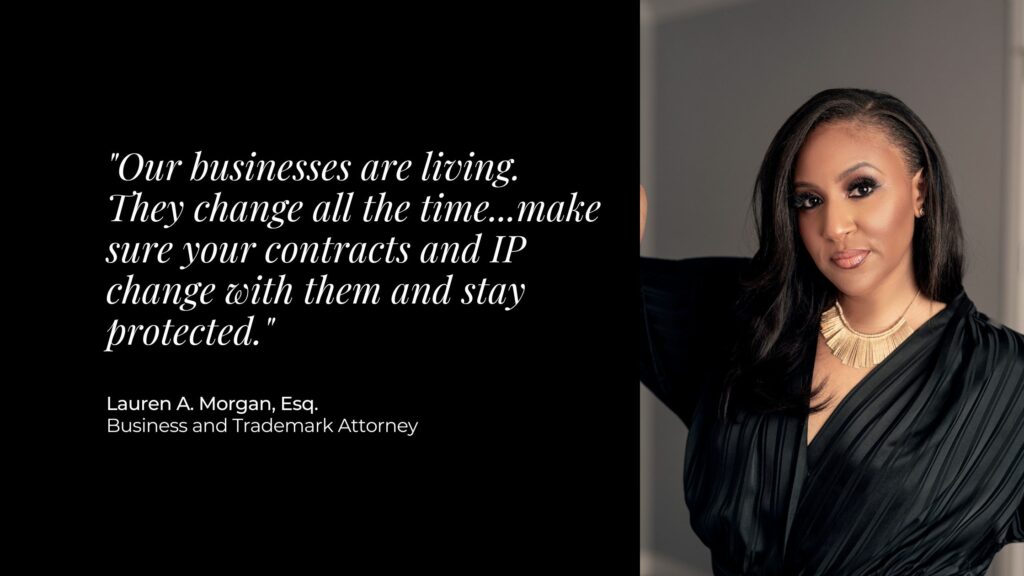
Lauren Morgan, Esq. bio
Lauren Morgan, Esq. is the founding attorney behind Activated Law & The Legal Know. A tenacious powerhouse from the start, Lauren Morgan graduated high school at sixteen and became a college student running her first nonprofit. In 2017, Lauren exited Corporate America to blaze new trails, starting her own law firm in Phoenix, Activated Law. Activated Law is a boutique law firm providing pre-litigation legal services for small businesses. Voted one of the “Top 10 Solo Firms in AZ,” Lauren has continued to defy gravity while leading with faith.

